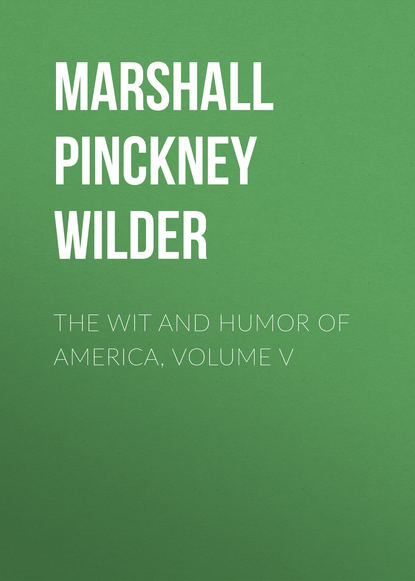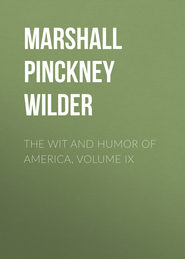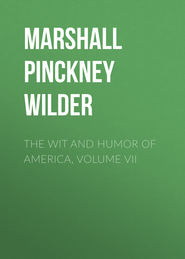По всем вопросам обращайтесь на: info@litportal.ru
(©) 2003-2024.
✖
The Wit and Humor of America, Volume V
Автор
Год написания книги
2019
Настройки чтения
Размер шрифта
Высота строк
Поля
"You will stay, won't you?" Adnah anxiously asked him.
"I think I shall take you with me, instead," he replied, smiling down at her in an attempt to conquer his embarrassment.
Adnah rapturously sighed. The spectators suddenly arose, retiring to the far corner of the room, where they held an excited, whispered consultation. Presently they came back and sat down in the same solemn half-circle. Aunt Sarah ceremoniously cleared her throat.
"You will please to unclasp your hands and sit farther apart," she directed. This obeyed, she proceeded: "Now, Mr. Nelson—"
"Melton, if you please," corrected the young man, producing a business card that he had rescued.
"Oh!" exclaimed the aunts, exchanging wondering glances.
"We understood that it was Nelson," murmured Aunt Matilda. It seemed that the hands had not been so tightly clasped over the ears as he had thought.
Aunt Sarah gravely adjusted her glasses.
"'John Melton, Jr.,'" she read. "'Representing Melton and Melton, Administrators and Real Estate Dealers. General John A. Melton. John Melton, Jr.'"
There was a suppressed flutter of excitement and again the three aunts exchanged surprised glances.
"I think I may safely say, may I not, Sisters Ann and Matilda, that this quite alters the case?" was Aunt Sarah's strange query.
"Quite so, indeed," agreed Aunt Matilda, complacently smoothing her apron.
"Very much so," added Aunt Ann.
"Decidedly," resumed Aunt Sarah. "Your father, young man, handled the estate of our deceased Uncle Peter in a most upright and satisfactory fashion—for a man. So far, much is in your favor, since our unfortunate niece will not be contented without some sort of a husband. Your personal qualifications have yet to be proved, however. We presume that you can offer documentary evidence as to your own worth, sir?"
"Not for a day or so, unfortunately," confessed the young man. "The dogs destroyed all my papers. The only thing I could find was a portion of a brief note from my mother."
The three aunts, as by one electric impulse, bent forward with shining eyes.
"From your mother!" hungrily repeated Aunt Sarah. "Let us see it, if you will, please."
He produced it reluctantly. It was not exactly the sort of letter a young man cares to parade.
"'My beloved son,'" Aunt Sarah read aloud, pausing to bestow a softened glance upon him. "'I can not wait for your return to say how proud I am of you. Your noble and generous action in regard to the aged widow Crane's property has just come to my ears, through a laughing complaint of your father about your unbusinesslike methods in dealing with those who have been unfortunate. In spite of his whimsically expressed disapproval, he feels that you are an honor to him. Your sister Nellie cried in her pride and love of you when she heard—'"
The rest of the letter had been lost, but this was enough.
Adnah had gradually hitched closer to him, and now her hand, unreproved, stole affectionately to his shoulder. Aunt Matilda was wiping her eyes. Aunt Ann openly sniffled. Aunt Sarah cleared her throat most violently.
"Your references are all that we could wish, young man," she presently admitted in a businesslike tone. "We shall waive, in your favor, our objections to men in general. If we must have one in the family we are to be congratulated upon having one whose mother is proud of him."
Coming from Aunt Sarah this was a marvelous concession. The young man bowed his head in pleased acknowledgment and, by and by, crossed his legs in comfort as a home-like feeling began to settle down upon him. Suddenly observing their bloomered exposure, however, he tried to poke his legs under the couch, and twiddled his thumbs instead.
"And when do our young people expect to be married?" meek Sister Ann presently ventured to inquire.
"As quickly as possible," promptly answered the young man, smiling triumphantly down at the girl by his side. He was astonished, and rather pleased, too, to find her suddenly embarrassed and blushing prettily.
"I believe, then," announced Aunt Sarah, after due deliberation, "that you may now kiss our niece; may he not, Sisters Ann and Matilda?"
"He may!" eagerly assented the others.
"Very well, then, proceed," commanded Aunt Sarah, folding her arms.
The young man hastily braced himself to meet this new shock, then gazed down at the girl again. She was still blushing in her newly-found self-conscious femininity, but she trustingly held up her pretty lips to him, looking full into his eyes with the steady flame of her love burning unveiled—and he kissed her.
"Ah-h-h-h!" sighed the three man-hating spinsters in ecstatic unison.
A LETTER FROM A SELF-MADE MERCHANT TO HIS SON
By George Horace Lorimer
[From John Graham, at the London House of Graham & Co., to his son, Pierrepont, at the Union Stock Yards in Chicago. Mr. Pierrepont is worried over rumors that the old man is a bear on lard, and that the longs are about to make him climb a tree.]
London, October 27, 189-
Dear Pierrepont: Yours of the twenty-first inst. to hand and I note the inclosed clippings. You needn't pay any special attention to this newspaper talk about the Comstock crowd having caught me short a big line of November lard. I never sell goods without knowing where I can find them when I want them, and if these fellows try to put their forefeet in the trough, or start any shoving and crowding, they're going to find me forgetting my table manners, too. For when it comes to funny business I'm something of a humorist myself. And while I'm too old to run, I'm young enough to stand and fight.
First and last, a good many men have gone gunning for me, but they've always planned the obsequies before they caught the deceased. I reckon there hasn't been a time in twenty years when there wasn't a nice "Gates Ajar" piece all made up and ready for me in some office near the Board of Trade. But the first essential of a quiet funeral is a willing corpse. And I'm still sitting up and taking nourishment.
There are two things you never want to pay any attention to—abuse and flattery. The first can't harm you and the second can't help you. Some men are like yellow dogs—when you're coming toward them they'll jump up and try to lick your hands; and when you're walking away from them they'll sneak up behind and snap at your heels. Last year, when I was bulling the market, the longs all said that I was a kindhearted old philanthropist, who was laying awake nights scheming to get the farmers a top price for their hogs; and the shorts allowed that I was an infamous old robber, who was stealing the pork out of the workingman's pot. As long as you can't please both sides in this world, there's nothing like pleasing your own side.
There are mighty few people who can see any side to a thing except their own side. I remember once I had a vacant lot out on the Avenue, and a lady came in to my office and in a soothing-sirupy way asked if I would lend it to her, as she wanted to build a crèche on it. I hesitated a little, because I had never heard of a crèche before, and someways it sounded sort of foreign and frisky, though the woman looked like a good, safe, reliable old heifer. But she explained that a crèche was a baby farm, where old maids went to wash and feed and stick pins in other people's children while their mothers were off at work. Of course, there was nothing in that to get our pastor or the police after me, so I told her to go ahead.
She went off happy, but about a week later she dropped in again, looking sort of dissatisfied, to find out if I wouldn't build the crèche itself. It seemed like a worthy object, so I sent some carpenters over to knock together a long frame pavilion. She was mighty grateful, you bet, and I didn't see her again for a fortnight. Then she called by to say that so long as I was in the business and they didn't cost me anything special, would I mind giving her a few cows. She had a surprised and grieved expression on her face as she talked, and the way she put it made me feel that I ought to be ashamed of myself for not having thought of the live stock myself. So I threw in a half dozen cows to provide the refreshments.
I thought that was pretty good measure, but the carpenters hadn't more than finished with the pavilion before the woman telephoned a sharp message to ask why I hadn't had it painted.
I was too busy that morning to quarrel, so I sent word that I would fix it up; and when I was driving by there next day the painters were hard at work on it. There was a sixty-foot frontage of that shed on the Avenue, and I saw right off that it was just a natural signboard. So I called over the boss painter and between us we cooked up a nice little ad that ran something like this:
Graham's Extract:
It Makes the Weak Strong
Well, sir, when she saw the ad next morning that old hen just scratched gravel. Went all around town saying that I had given a five-hundred-dollar shed to charity and painted a thousand-dollar ad on it. Allowed I ought to send my check for that amount to the crèche fund. Kept at it till I began to think there might be something in it, after all, and sent her the money. Then I found a fellow who wanted to build in that neighborhood, sold him the lot cheap, and got out of the crèche industry.
I've put a good deal more than work into my business, and I've drawn a good deal more than money out of it; but the only thing I've ever put into it which didn't draw dividends in fun or dollars was worry. That is a branch of the trade which you want to leave to our competitors.
I've always found worrying a blamed sight more uncertain than horse-racing—it's harder to pick a winner at it. You go home worrying because you're afraid that your fool new clerk forgot to lock the safe after you, and during the night the lard refinery burns down; you spend a year fretting because you think Bill Jones is going to cut you out with your best girl, and then you spend ten worrying because he didn't; you worry over Charlie at college because he's a little wild, and he writes you that he's been elected president of the Y.M.C.A.; and you worry over William because he's so pious that you're afraid he's going to throw up everything and go to China as a missionary, and he draws on you for a hundred; you worry because you're afraid your business is going to smash, and your health busts up instead. Worrying is the one game in which, if you guess right, you don't get any satisfaction out of your smartness. A busy man has no time to bother with it. He can always find plenty of old women in skirts or trousers to spend their days worrying over their own troubles and to sit up nights waking his.
Speaking of handing over your worries to others naturally calls to mind the Widow Williams and her son Bud, who was a playmate of mine when I was a boy. Bud was the youngest of the Widow's troubles, and she was a woman whose troubles seldom came singly. Had fourteen altogether, and four pair of 'em were twins. Used to turn 'em loose in the morning, when she let out her cows and pigs to browse along the street, and then she'd shed all worry over them for the rest of the day. Allowed that if they got hurt the neighbors would bring them home; and that if they got hungry they'd come home. And someways, the whole drove always showed up safe and dirty about meal time.
I've no doubt she thought a lot of Bud, but when a woman has fourteen it sort of unsettles her mind so that she can't focus her affections or play any favorites. And so when Bud's clothes were found at the swimming hole one day, and no Bud inside them, she didn't take on up to the expectations of the neighbors who had brought the news, and who were standing around waiting for her to go off into something special in the way of high-strikes.
She allowed that they were Bud's clothes, all right, but she wanted to know where the remains were. Hinted that there'd be no funeral, or such like expensive goings-on, until some one produced the deceased. Take her by and large, she was a pretty cool, calm cucumber.
But if she showed a little too much Christian resignation, the rest of the town was mightily stirred up over Bud's death, and every one just quit work to tell each other what a noble little fellow he was; and how his mother hadn't deserved to have such a bright little sunbeam in her home; and to drag the river between talks. But they couldn't get a rise.








